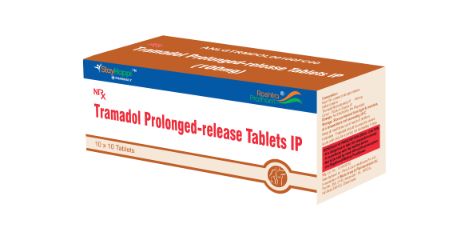Uncategorized
100mg Tramadol Capsules: What You Need to Know About This Pain Medication
100mg Tramadol Capsules100mg tramadol capsules are commonly prescribed for individuals experiencing moderate to severe pain. Tramadol, a synthetic opioid, helps manage pain by affecting how the brain perceives and responds to pain signals. Available in different forms, including capsules, tramadol provides effective relief for those dealing with chronic pain conditions, post-surgery recovery, or injury-related pain.
In this blog post, we’ll explore the uses, benefits, potential side effects, and safety tips for taking 100mg tramadol capsules.
What are 100mg Tramadol Capsules?
Tramadol is an opioid-like pain reliever that works by binding to the brain’s opioid receptors and increasing levels of certain neurotransmitters like serotonin and norepinephrine. This combination not only relieves pain but can also improve mood. The 100mg tramadol capsule is a higher dose of the drug, often prescribed for individuals who have not found adequate relief with lower doses or non-opioid medications.
Uses of 100mg Tramadol Capsules
Tramadol is versatile in its application and is used to manage various types of pain, including:
- Chronic Pain: Conditions like arthritis, fibromyalgia, and back pain can be alleviated with tramadol when other medications fail to offer relief.
- Post-Surgical Pain: Following surgeries, tramadol can help manage pain, making recovery more comfortable.
- Injury-Related Pain: Tramadol is effective in treating pain from injuries like fractures, sprains, or strains, offering relief when over-the-counter options aren’t sufficient.
Benefits of 100mg Tramadol Capsules
- Effective Pain Relief: The 100mg dosage is especially beneficial for individuals requiring stronger pain management. It helps manage pain that would otherwise interfere with daily activities.
- Extended Release Options: Some tramadol capsules come in extended-release formulations, which means they slowly release the drug over time, providing longer-lasting pain relief, particularly for chronic conditions.
- Less Sedating Than Stronger Opioids: Tramadol is generally considered to cause less sedation and drowsiness compared to stronger opioids like morphine or oxycodone, although this varies from person to person.
How Do 100mg Tramadol Capsules Work?
The capsules work by changing how your brain interprets pain signals. Tramadol binds to opioid receptors in your central nervous system, blocking pain signals from reaching your brain. Additionally, by increasing serotonin and norepinephrine levels, tramadol improves mood and reduces the emotional distress associated with pain.
Common Side Effects of 100mg Tramadol Capsules
Like any medication, tramadol can cause side effects, particularly when taken at higher doses like 100mg. Some of the more common side effects include:
- Drowsiness and Fatigue: Tramadol can make you feel tired or drowsy, particularly when you first start taking it or after increasing your dose.
- Nausea and Vomiting: Many people experience nausea, especially at the beginning of their tramadol treatment.
- Constipation: Opioid medications are known to slow down the digestive system, leading to constipation. Drinking water and eating fiber can help manage this issue.
- Dizziness: Feeling lightheaded or dizzy is another common side effect, so it’s important to avoid activities that require full alertness, such as driving.
Serious Risks of 100mg Tramadol Capsules
In some cases, tramadol can cause more serious side effects, particularly when taken in higher doses or combined with other medications. These include:
- Respiratory Depression: At high doses or when combined with other central nervous system depressants like alcohol or sedatives, tramadol can slow your breathing. This can be dangerous and requires immediate medical attention.
- Seizures: Tramadol can increase the risk of seizures, especially for individuals who have a history of seizures or those taking medications that affect the seizure threshold.
- Serotonin Syndrome: Because tramadol affects serotonin levels, it can lead to a potentially life-threatening condition called serotonin syndrome, especially when taken with other medications that affect serotonin, such as antidepressants. Symptoms include confusion, rapid heart rate, and high blood pressure.
- Dependence and Withdrawal: While tramadol is considered less addictive than other opioids, there is still a risk of dependence. If you stop taking the medication suddenly after using it for an extended period, you may experience withdrawal symptoms like anxiety, sweating, and nausea.
How to Take 100mg Tramadol Capsules Safely
To use tramadol safely and effectively, follow these tips:
- Take as Prescribed: Always take 100mg tramadol capsules exactly as prescribed by your doctor. Do not take more than the recommended dose, even if you feel your pain isn’t fully managed. Increasing the dose without medical advice can increase the risk of serious side effects.
- Avoid Mixing with Alcohol: Mixing tramadol with alcohol or other central nervous system depressants can increase the risk of dangerous side effects like respiratory depression.
- Monitor Side Effects: If you notice unusual side effects, especially more severe ones like breathing difficulties, confusion, or signs of serotonin syndrome, seek medical attention immediately.
- Don’t Stop Abruptly: If you’ve been taking tramadol for an extended period, consult your doctor before discontinuing use. They may suggest a gradual reduction in dosage to avoid withdrawal symptoms.
When to Consult Your Doctor
It’s important to speak with your healthcare provider if you have any concerns about taking tramadol. If you experience side effects that are difficult to manage, or if the 100mg capsules aren’t effectively managing your pain, your doctor may adjust your dose or explore other pain management options.
Conclusion
100mg tramadol capsules offer a powerful solution for managing moderate to severe pain. Whether you are dealing with chronic conditions, recovering from surgery, or coping with injury-related pain, tramadol can help improve your quality of life by providing effective relief. However, as with any opioid medication, it’s crucial to use it responsibly, follow your doctor’s instructions, and be aware of potential side effects. By doing so, you can safely benefit from the pain-relieving effects of tramadol while minimizing the risks associated with its use.


Интересно: https://luxmsk.ru/catalog/brendovaya-zhenskaya-obuv/brendovye-zhenskie-tufli/goyard/ или https://luxmsk.ru/catalog/muzhskie-sumki/brendovye-muzhskie-sumki/stefano-ricci/
Может быть полезным: джинсы balenciaga мужские или Верхняя одежда мужская louis-vuitton
Хороший вариант – https://luxmsk.ru/catalog/brendovaya-zhenskaya-odezhda/brendovye-zhenskie-dzhinsy/bottega-veneta/